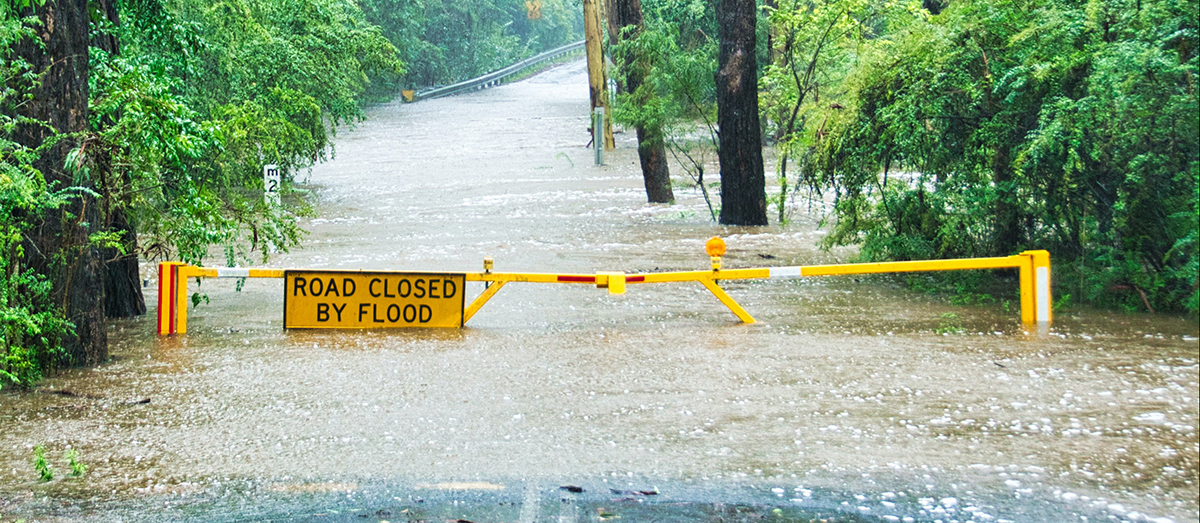
October 14, 2022
Acts of God/Weather
Acts of God involving unexpected and extreme forces of nature are normally considered to be beyond the control and without the fault or negligence of the contractor. Generally, an act of God is an unusual and extraordinary occurrence of such magnitude and severity that it is not reasonably foreseeable by a traditional, reasonable, and prudent party under the circumstances.
In the design and construction contract context, this definition implies that an act of God is an occurrence that reasonably prudent contracting parties would not contemplate as being foreseeable at the time of contracting. Such acts are one type of force majeure event and include but are not limited to floods, fires, earthquakes, hurricanes, and tornadoes. Delays resulting from acts of God/force majeure are normally excusable but noncompensable events in the absence of a clause in the contract stating otherwise.
Unusually severe weather is an act of God that has been separately classified due to the frequency with which contractors cite it as a cause for excusable delay. All types of normally expected weather conditions may impact the contractor’s performance: rain, the rainy season, high humidity, high winds, frozen earth, snow and winter weather, and high heat and summer weather. Generally, weather for a particular location and time of year can be characterized as falling into one of three categories—ideal, normal, and unusually severe—with the last category being the only basis for excusable delay.
If the weather complained of is not unusually severe for the particular time and place, and the contractor should have reasonably anticipated these conditions, there typically is no justification for an extension of time. Accordingly, if a contractor is working in an area where there is predictably one hurricane a year (as compiled in the U.S. Weather Bureau records), the contractor may not be entitled to an extension of time for unusually severe weather resulting from a hurricane encountered during performance. However, if there are four hurricanes in this area in the one-year period, the contractor may be entitled to relief.
In seeking time extensions for inclement weather in construction law, the contractor must not only show the occurrence of unusually severe weather, but also it must show the type of work being performed and the effect of the weather on the work. To determine whether a contractor is entitled to a time extension for unusually severe weather, certain facts must be established and criteria met: (1) there must be identification of the work controlling the overall completion of the contract, i.e., the work that is on the critical path at the time that the unusually severe weather occurred; (2) it must be established that this controlling, critical path work was delayed by the weather; and (3) it must be established that the weather was unforeseeable and unusually severe. Time extensions resulting from unusually severe weather are best proven using a CPM schedule analysis. This tool will not only show which work was affected by the weather but also whether that work was critical and the role other delays, some of which may be concurrent to the weather delays, had on the ability of the contractor to perform according to its plan.
To be excused from the liability for delay and receive a time extension for weather-related delays, the contractor must prove that the delay was attributed to conditions that varied substantially from the normal average or reasonably expected weather for a particular area during a specific season. The type of work being performed is also a consideration in determining if weather conditions affected progress. In the early outdoor activities of construction, obviously most susceptible to weather-related problems, weather conditions can seriously affect the entire project schedule. If indoor work is not hampered and can still progress, delay would not be considered for the entire project schedule but only for those activities for which weather is the proximate cause of delay.
A contractual right for a time extension for weather-related delays may not be automatic. Act of God contract clauses usually identify specific requirements for giving timely notice to the owner if an extension of time is requested. In some instances, constructive notice may be sufficient. Also, certain contracts or government statutes may not require a contractor to be responsible for the cost of repairing or restoring damage to the work proximately caused by an act of God. Unusually severe weather delays may be better dealt with if upon the occurrence of such delays, the contractor gives notice to the owner and requests a change order signed by both parties so that the contractual completion date or the amount to be paid on the contract is modified if additional compensation is contractually available.
In the event of an excusable weather delay, the owner must grant a time extension, permitting the contractor to complete the work later than the originally scheduled date of completion. The owner may not assess liquidated damages, may not terminate the contractor for default, and may not accelerate the schedule to adhere to the original schedule without additional compensation for an excusable weather delay. Conversely, certain excusable delays are not compensable to the contractor, and recovery from the owner of additional costs incurred is normally not possible. If an owner-caused problem, however, shifts the contractor’s work into a season of unfavorable weather that becomes the proximate cause of the delay, a compensable delay may result, and the additional costs of work may be recoverable.
Proving that weather was unusually severe can be problematic. Generally, weather bureau statistics over a five to ten-year period are relied on to show normal weather conditions. The key is the use of detailed weather data to show the specific effect on the project.
Granting weather-related delays can be equitable to both the owner and contractor provided the proper data is obtained. Official weather records are the best source of evidence in determining what is normal and what could have or should have reasonably been anticipated. Obtaining climatological data for the previous five to ten years has been used as an acceptable period to establish weather patterns for use in comparison to the actual weather conditions. Keeping accurate daily log reports that include the actual weather conditions are necessary to support unfavorable weather assertions made. Two sources where weather data can be obtained are:
National Climatic Center
(Provides weather history)
Asheville, North Carolina 28801
(704) 259-0682
https://www.ncei.noaa.gov/cdo-web/
National Weather Service
(Provides daily weather maps)
Silver Spring, Maryland 20910
(571) 888-3500
https://www.weather.gov/lwx/ObservedWeatherMaps
ADDITIONAL RESOURCES

Blog
Discover industry insights on construction disputes and claims, project management, risk analysis, and more.
MORE

Articles
Articles by our engineering and construction claims experts cover topics ranging from acceleration to why claims occur.
MORE

Publications
We are committed to sharing industry knowledge through publication of our books and presentations.
MORE
Recommended Reads
Construction Claim Types for Contractors
U.S. federal and state courts recognize 19 basic construction claim entitlements for a contractor’s recovery of damages. This post is the first of a series discussing each of these 19 types.
READ
Definitions of Construction Claim Types for Contractors
The author summarizes the definitions of the 19 construction claim types that may apply to a contractor's and subcontractor's recovery of time and costs.
READ
Directed and Constructive Acceleration
The desire to minimize costs and contractual performance time often leads to directed or constructive acceleration.
READ

